 Petzlover
PetzloverGrand Anglo-Francais Blanc et Noir is originated from France but Southern Hound is originated from United Kingdom. Both Grand Anglo-Francais Blanc et Noir and Southern Hound are having almost same height. Grand Anglo-Francais Blanc et Noir may weigh 9 kg / 19 pounds lesser than Southern Hound. Both Grand Anglo-Francais Blanc et Noir and Southern Hound has almost same life span. Both Grand Anglo-Francais Blanc et Noir and Southern Hound has same litter size. Grand Anglo-Francais Blanc et Noir requires Moderate Maintenance. But Southern Hound requires Low Maintenance
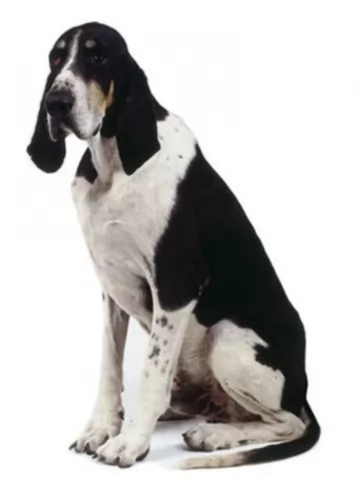 Known also as the Great Anglo-Francais, White and Black Hound or the Grand Anglo, the Francais Blanc et Noir is one of several breeds of hounds.
Known also as the Great Anglo-Francais, White and Black Hound or the Grand Anglo, the Francais Blanc et Noir is one of several breeds of hounds.
The dog was bred by crossing French scenthounds with English Foxhounds.The Grand Anglo-Français Blanc et Noir has always been used for hunting. As a scenthound, hunting was always done in packs and he thrilled at the chase.
The large dog originates in France and is recognized by the French Kennel Club as well as the Federation Cynologique Internationale.The purpose of this breed standard is to provide guidelines for breeders wishing to maintain the quality of their breed, but to also improve it.
The Southern Hound hails from England and is a breed of dog that existed sometime in the 19th century.
There isn’t much information available as to the time the dog became extinct. Some people believe that other breeds were bred with the dog until the true Southern Hound bloodline no longer existed. It was a breed of scent hound, and had an excellent sense of smell.
Known also as the Old English Hound, it was during the 18th century that the Southern Hound’s popularity waned and other kinds of hounds became more prominent.
While the Southern Hound has been extinct for decades, there is still some of this dog breed found in modern day breed.
It s believed that the Southern Hound has been used in the development of the Beagle and the Bloodhound as you can see the similarities.
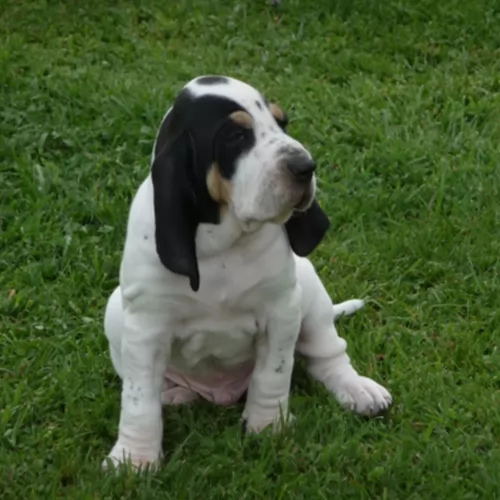 The Grand Anglo – Francais Blanc et Noir is a big, powerful dog standing at 62 – 72cm and weighing 27 - 32kg. His chest is broad and deep.
The Grand Anglo – Francais Blanc et Noir is a big, powerful dog standing at 62 – 72cm and weighing 27 - 32kg. His chest is broad and deep.
The head is flat and broad, the nose black with gentle looking brown eyes. The coat is short and dense for protection and the coloring is black and white. There is a tan dot above each eye. The ears are floppy. The tail is long and tapers down to a slender point.
As a superb hunting dog, this breed lives for the hunt and loves nothing more than to be chasing its prey. The dog has an excellent sense of smell and can track prey in all kinds of terrain.
Although the dog has a stable temperament, he isn’t recommended as being kept solely as a pet, even though he is gentle with children. Maybe its because he has a more serious personality and would prefer to live with active, sport-loving adults than having to contend with the antics of children.
He also isn’t the best dog to have around other small pets as he is so prey-driven he may well be aggressive towards them.
He isn’t a city-loving dog and with his high energy levels he is best suited to properties with large gardens or to farm life. While he will bark and alert you to strangers, he won’t make a particularly good watchdog as he isn’t aggressive.
The Southern Hound was a large, solidly built, deep chested dog with a square head and a longish muzzle. He stood at between 58-71 cm in height and weighed 25 – 41kg.
The Southern Hound had long, wide floppy ears, much like the Basset Hound of today. The tail was fairly long and curved upright. It was known for its deep melodious voice, much like the Bloodhound we have today.
It had excellent scenting abilities and was used to follow the trail of its prey. The coat of the Southern Hound was short and smooth and it is believed that the most common colors for the coat were white with black or brown markings, making it a tricolor dog.
Used to being on the hunt with other dogs, there is no doubt that the Southern Hound wasn’t aggressive towards other dogs and that he knew how to get along with them. It’s a dog that was dedicated to to the hunt and was bred to work, known for its stamina and endurance.
The dog didn’t possess strong herding or protective instincts and it is thought that it wasn’t kept as a companion dog. Because of the breeds used to develop this dog, it is assumed that it was a non-aggressive, friendly dog.
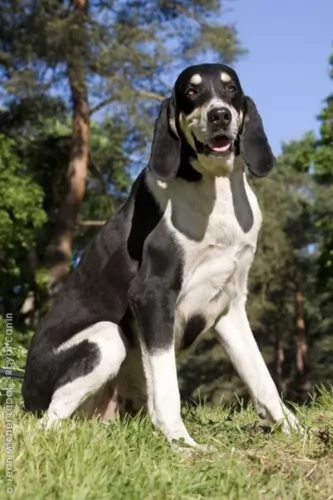 Essentially known as a pack dog, the Grand Anglo-Français Blanc et Noir isn’t going to do well with anyone who lazes on the couch all day.
Essentially known as a pack dog, the Grand Anglo-Français Blanc et Noir isn’t going to do well with anyone who lazes on the couch all day.
He is energetic and driven, and will develop all kinds of behavioral issues if not properly and adequately exercised.
Fitting into a household where hunting is part of the lifestyle will be ideal for him, loving the outdoors and the stimulation that comes from hunting with other dogs.
Provide him with an outdoorsy, active owner and this hunting dog will ensure that he is your loyal and loving companion.
The Southern Hound is no longer in existence, which is a pity as it seems as though he may have made an excellent pet in modern times.
They were a playful breed, loyal, gentle and affectionate and no doubt made a good watchdog too, although it is thought that his protective instincts weren’t good.
They aren’t dogs recommended for city living, but it seems according to the few records there are of this dog that he could have made a reliable, loving pet to have around.
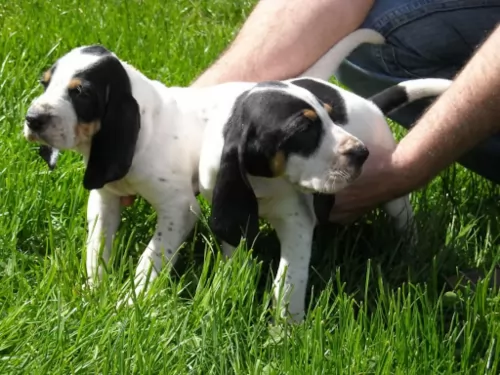 Capable of reaching 10 to 12 years of age when looked after well, there aren’t any specific health issues with this dog. He is likely to experience one or two issues that other dogs have to contend with as well.
Capable of reaching 10 to 12 years of age when looked after well, there aren’t any specific health issues with this dog. He is likely to experience one or two issues that other dogs have to contend with as well.
There are one or two diseases that you want to be aware of -
This dog has long, floppy ears and this means that air doesn’t reach inside the ears properly. He is therefore prone to ear infections. After he has been swimming, dry his ears gently inside.
Unfortunately this is a disease that can strike even when your Grand Anglo-Francais Blanc et Noir is a puppy. Hips which aren’t formed properly can cause stiffness, pain and lameness in your pet.
The Southern Hound had drop ears which would have made him prone to ear infections. This is because unlike dogs with erect ears, air isn’t able to circulate into the ear and the inside of the ear become a breeding place for bacteria.
The dog may have had to deal with Cherry Eye too. This eye problem affects the tear gland in the third eyelid. It needs to be treated so as to avoid long term eye problems. This is also because exposure of the tissue can bring on swelling, inflammation and infection.
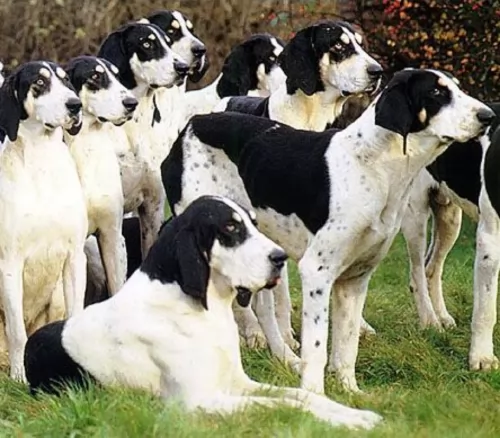 With his short coat and being an average shedder, the Grand Anglo-Francais Blanc et Noir is an easy dog to groom, requiring a brush twice a week.
With his short coat and being an average shedder, the Grand Anglo-Francais Blanc et Noir is an easy dog to groom, requiring a brush twice a week.
Check his ears inside and out, particularly if he goes swimming. Excess moisture in the ear can encourage bacteria and ear infections. See that his nails are trimmed and remember to check his teeth for dental disease which can cause ill health generally.
As a hunting dog, he will need a good deal of exercise. He won’t be content to just go for a walk once a day, but will want something more hectic such as joining you as you go hiking, cycling, swimming or jogging.
As a scenthound, your Grand Anglo – Francais Blanc et Noir is always out and about sniffing around looking for a tasty treat, but with these active dogs, the secret is to small, frequent meals as apposed to 1 or 2 large meals.
It is important to see he gets a nutritionally complete balanced diet that gives him slow release energy. Check with your vet if you’re unsure what to feed him. You want to avoid foods high in fillers, colorants and preservatives.
There are some excellent commercially manufactured dog foods for high energy dog,s but make sure to go for the best brands. You can mix his kibble with some raw meat occasionally and also give him cooked brown rice, chicken and vegetables. He’ll need a constant supply of fresh, cool water.
Because this dog was once used as a hunting dog, they were accustomed to large open spaces. He would have required a fair amount of exercise. They would have needed a walk every day if he wasn't involved in a hunt that day.
The Southern Hound had a short coat and in those days he probably would have needed to be brushed once or twice a week.
The Southern Hound would have required top quality food to support his energy. If in that time there has been commercially manufactured food, it would have had to be the better quality ones. Today if you were feeding the Southern Hound you would check out the ingredients on the packaging and go for the dog foods with wholesome, natural ingredients in them.
No doubt the owners of these dogs provided their dogs with raw and cooked meat. If you had a Southern Hound today you would try to include some home-made food for him which would be simply mixed into the dry kibble twice a week. Boiled chicken, brown rice or pasta and spinach, sweet potatoes and carrots is super nutritious.
The Southern Hound would have required a constant supply of fresh, cool water within his reach.